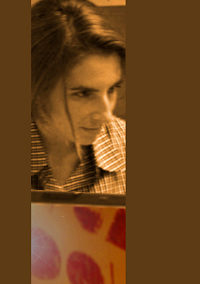Netmeeting with Maria Roussou
April 14th, 2004
Categories: Applications, Cultural Heritage, Education, Human Factors, Multimedia, Networking, Software, Tele-Immersion, Video / Film, VR Art

About
Interactive virtual reality designer, researcher, producer, and educator, engaged in combining innovative technology with education and culture. For four years (1998-2002) Maria Roussou directed the Virtual Reality Department at the Foundation of the Hellenic World, a cultural heritage institution based in Athens, Greece, where she was responsible for the virtual reality infrastructure, programs, research, and design of the overall visitor experience. During her extensive work with the CAVE® at the Electronic Visualization Laboratory in Chicago, she earned her M.S. and MFA degrees from the University of Illinois at Chicago. She focused on the design, application, and evaluation of virtual and digital media environments for education and the representation of cultural information. Maria has collaborated with artists (e.g. with Muntadas as a Production Coordinator for the File Room) and many museums, including contemporary art museums such as the Walker Art Center, to design and create interactive art education material for the Internet. Her projects and collaborations have been featured internationally, she has been a regular member of the program and organizing committees of numerous exhibitions and conferences, has lectured extensively, and has served as Expert Evaluator to the European
Commission FP5 & FP6 IST Programmes. She is currently pursuing a PhD in VR / HCI at the University of London (UCL). Maria has work experience in Greece and the USA and is a member of ACM, IEEE, ICOM, AAM, and AACE.
Topics:
- Experience as a student at EVL: How and what was useful for you while studying at UIC?
- Goals and accomplishments since you concluded your studies: What have you done and what are you doing now?
- Major difficulties, if there were any, faced in the professional world and how were they overcome?
- Critical analysis of the path: From being a “student” to becoming an active professional in the “real” world
- The most interesting and challenging work completed as an artist, and what was learned?
- What do you advise to an artist who is working in VR? What are the most important things for an artist to know “before” and “after” they get involved in Virtual productions?
- Can a VR artist (not professional computer graphics programmers) be completely autonomous / independent as a producer or will programmers and software developers always be needed?
- About your virtual reality art works and research projects: Concepts, motivations, goals, production process, and implementation